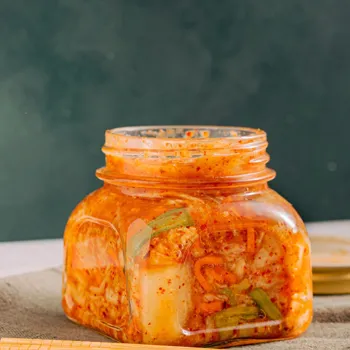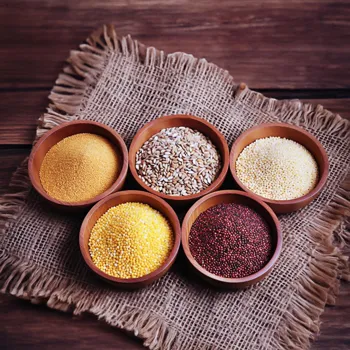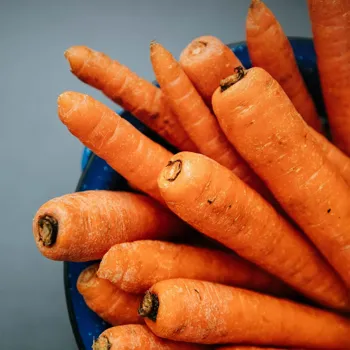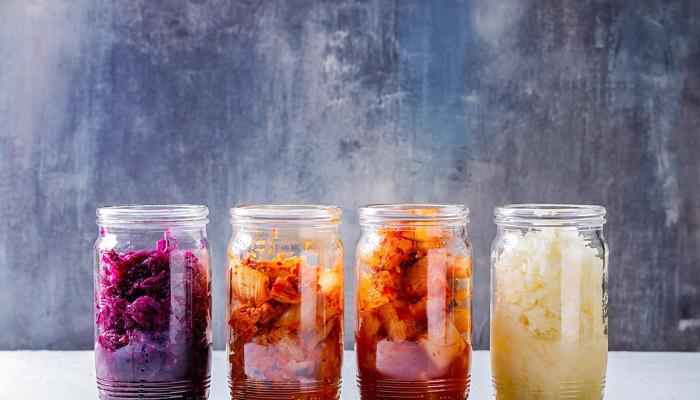Unlock the Magic of Fermented Foods in Indian Diets. Dive into the world of tradition and health benefits. Read more
For generations, Indian households have embraced the magic of fermentation, a process
that not only enhances the flavour of food but also unlocks a treasure trove of health benefits.
From the tangy idlis and dosas of the South to the refreshing kanji of the North, fermented foods are deeply ingrained in the culinary landscape of India. But beyond their delicious taste, these foods offer a wealth of advantages for our gut health, immunity, and overall well-being.
Let's delve into the world of fermented foods, exploring their benefits, traditional recipes, and tips on incorporating them into your daily diet.
Fermentation enhances food flavor and nutrition naturally in Indian cuisine
Fermentation is more than just a culinary technique; it's a natural transformation process where microorganisms like bacteria and yeast convert carbohydrates into acids, gases, or alcohol.

This process not only preserves food but also creates a unique flavour profile and enhances its nutritional value. In the Indian context, fermentation is a time-honoured tradition, passed down through generations, with each region boasting its own unique fermented delicacies.
The beauty lies in the simplicity - using readily available ingredients and allowing nature to work its magic. This natural process boosts the nutritional value of our food, making it easily digestible. This further helps your body to absorb the nutrients better and faster.
Fermented foods aid gut health by supplying probiotics for overall well-being
The benefits of including fermented foods in our diet are numerous and well-documented. One of the primary advantages lies in their probiotic content. Probiotics are beneficial bacteria that reside in our gut, playing a crucial role in maintaining a healthy gut microbiome.
This microbiome is essentially a complex ecosystem of microorganisms that influence various aspects of our health, including digestion, immunity, and even mental well-being.
Fermented foods, being rich in probiotics, help replenish and nourish this gut ecosystem, promoting a healthy balance of good bacteria and reducing the risk of digestive issues like bloating, constipation, and Irritable Bowel Syndrome (IBS). A healthy gut leads to a strong body and better health.
Fermentation boosts nutrient absorption and digestion
Moreover, fermentation enhances the bioavailability of nutrients in food. Bioavailability refers to the extent to which our body can absorb and utilize the nutrients present in food. During fermentation, microorganisms break down complex compounds, making nutrients more accessible for absorption.
For example, fermented foods often contain higher levels of vitamins, minerals, and antioxidants compared to their unfermented counterparts. Fermentation unlocks hidden nutritional potential, maximizing the benefits we derive from our food.
Additionally, some fermented foods contain enzymes that aid digestion, further easing the burden on our digestive system.
Popular Indian fermented foods boost health and flavor diversity
Now, let's explore some popular fermented foods that are staples in Indian diets. Idli and dosa, South Indian breakfast favourites, are made from a batter of fermented rice and lentils.
The fermentation process not only gives them their characteristic sour taste but also increases the bioavailability of iron and vitamins. Dhokla, a Gujarati snack, is made from fermented gram flour, making it a light and easily digestible option.
Kanji, a North Indian fermented drink made with black carrots, is a probiotic powerhouse, known for its refreshing taste and digestive benefits. Buttermilk, or chaas, a common accompaniment to Indian meals, is another excellent source of probiotics, aiding digestion and cooling the body.
These examples showcase the diversity of fermented foods across different regions of India.
Incorporate fermented foods for better gut health easily
Incorporating fermented foods into your diet is easier than you might think. You can start by including small servings of idli or dosa for breakfast. Adding a glass of buttermilk to your lunch or dinner is another simple way to boost your probiotic intake.
Pickles, made using traditional fermentation methods, can be enjoyed as a condiment. When choosing pickles, opt for varieties that are naturally fermented and free from artificial preservatives.
You can also try making your own fermented foods at home, such as yogurt or kanji, using simple recipes and readily available ingredients. Homemade options are often the healthiest, as you have control over the ingredients and fermentation process.
Starting small and gradually increasing your intake of fermented foods is generally recommended.
Recipe for ragi dosa with simple ingredients
Ingredients: 1 cup ragi flour, 1/2 cup urad dal (black lentils), 1 teaspoon fenugreek seeds, salt to taste.

Instructions
Soak urad dal and fenugreek seeds overnight. Grind to a smooth batter. Mix with ragi flour and salt. Allow to ferment overnight. Steam in idli molds until cooked through.
Recipe: Black carrot pickle with mustard & chilli
Ingredients: 500 grams black carrots, 2 tablespoons mustard powder, 1 teaspoon red chilli powder, salt to taste, water.

Instructions
Peel and slice black carrots. Mix with mustard powder, chilli powder, and salt. Add water and mix well. Transfer to a glass jar and cover with a muslin cloth. Allow to ferment in the sun for 3-7 days, stirring occasionally. Strain and enjoy.
Fermented foods boost health; consult professionals for advice
Incorporating fermented foods into your daily diet is a delicious and effective way to enhance your overall health and well-being. By embracing this age-old tradition, we can reap the numerous benefits for our gut health, immunity, and nutritional intake.
So, why not start exploring the wonderful world of fermented foods today and embark on a journey to a healthier, happier you? Remember to consult with a healthcare professional or registered dietician for personalized dietary advice.
AI Generated Content. Glance/InMobi shall have no liability for the content












